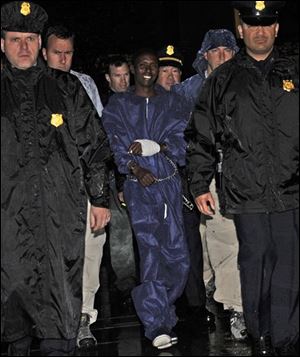
Somali pirate arrives in NYC, awaits court hearing
4/21/2009
Police and FBI agents escort the Somali pirate suspect U.S. officials identified as Abduhl Wali-i-Musi into FBI headquarters in New York on Monday, April 20, 2009. Abduhl Wal-i-Musi is the sole surviving Somali pirate suspect from the hostage-taking of commercial ship captain Richard Phillips from the Maersk Alabama.
NEW YORK A Somali teenager arrived to face what are believed to be the first piracy charges in the United States in more than a century, smiling but saying nothing as he was led into a federal building under heavy guard.
Abdiwali Abdiqadir Muse, the sole surviving Somali pirate from the hostage-taking of an American ship captain, was to appear in a courtroom Tuesday on what were expected to be piracy and hostage-taking charges.
Handcuffed with a chain wrapped around his waist and about a dozen federal agents surrounding him, the slight teen seemed poised as he passed through the glare of dozens of news cameras in a drenching rainstorm. His left hand was heavily bandaged from the wound he suffered during the skirmish on the cargo ship, the Maersk Alabama.
A law enforcement official familiar with the case said Muse (moo-SAY') was being charged under two obscure federal laws that deal with piracy and hostage-taking. The official spoke on condition of anonymity because the charges had not been announced.
The teenager was flown from Africa to a New York airport on the same day that his mother appealed to President Barack Obama for his release. She said her son was coaxed into piracy by "gangsters with money."
"I appeal to President Obama to pardon my teenager; I request him to release my son or at least allow me to see him and be with him during the trial," Adar Abdirahman Hassan said in a telephone interview with The Associated Press from her home in Galkayo town in Somalia.
The boy's father, Abdiqadir Muse, said the pirates lied to his son, telling him they were going to get money. The family is penniless, he said.
"He just went with them without knowing what he was getting into," Muse said in a separate telephone interview with the AP through an interpreter.
He also said it was his son's first outing with the pirates after having been taken from his home about a week and a half before he surrendered at sea to U.S. officials.
The young pirate's age and real name remained unclear. His parents said he is only 16; law enforcement said he is at least 18, meaning prosecutors will not have to take extra legal steps to try him in a U.S. court.
His worried family asked the Minneapolis-based Somali Justice Advocacy Center to help get him a lawyer, said the organization's executive director, Omar Jamal.
"What we have is a confused teenager, overnight thrown into the highest level of the criminal justice system in the United States out of a country where there's no law at all," Jamal said. Muse speaks no English, he said.
The suspect was taken aboard a U.S. Navy ship, the USS Bainbridge, shortly before Navy SEAL snipers killed three of his colleagues who had held Maersk Alabama Capt. Richard Phillips hostage.
The U.S. officials said the teenager was brought to New York to face trial in part because the FBI office here has a history of handling cases in Africa involving major crimes against Americans, such as the al-Qaida bombings of two U.S. embassies in East Africa in 1998.
Court documents list the suspect's name as Abduhl Wali-i-Musi, which the boy's parents have said is incorrect.
Ron Kuby, a New York-based civil rights lawyer, said he has been in discussions about forming a legal team to represent the Somali suspect.
"I think in this particular case, there's a grave question as to whether America was in violation of principles of truce in warfare on the high seas," said Kuby. "This man seemed to come onto the Bainbridge under a flag of truce to negotiate. He was then captured. There is a question whether he is lawfully in American custody and serious questions as to whether he can be prosecuted because of his age."